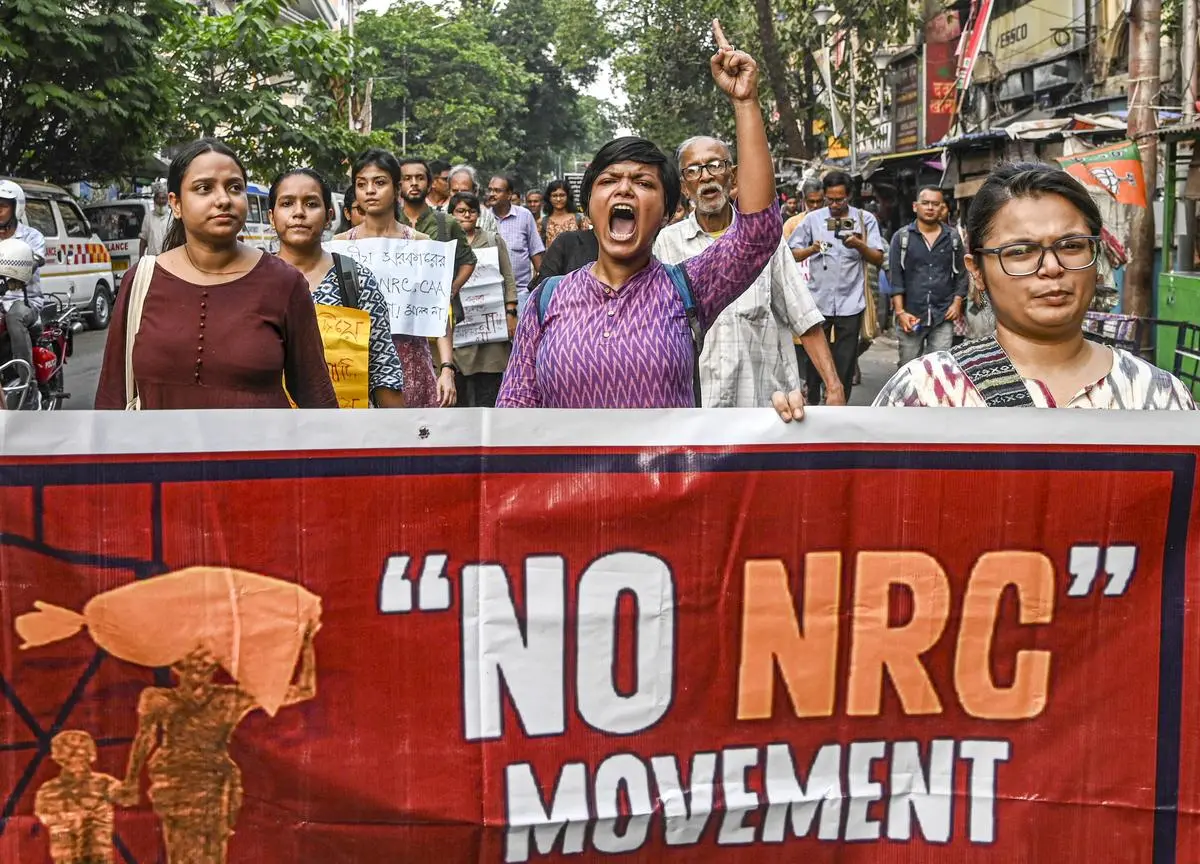After Bihar, the Election Commission of India (ECI) has in right earnest embarked upon a Special Intensive Revision (SIR) of the electoral rolls in 12 States and Union Territories. As the ECI made the announcement on October 27, 2025, to roll out Phase II of the SIR, the Bihar effect was unmissable.
It was also evident that like in Bihar, there will be no let-up in the political heat over the exercise as questions linger about the format of the SIR and its timing.
The 12 States and Union Territories included under Phase II of the SIR are Chhattisgarh, Goa, Gujarat, Kerala, Madhya Pradesh, Rajasthan, Tamil Nadu, Uttar Pradesh, West Bengal, Puducherry, Andaman and Nicobar Islands, and Lakshadweep. Of these, Assembly elections are scheduled in 2026 in Kerala, Tamil Nadu, West Bengal and Puducherry.
Assam, another State where Assembly elections are due in 2026, has been kept out of the SIR list for now. Maharashtra, where the Supreme Court has ordered local body elections to be held by January 31, 2026, has also been kept out of the SIR ambit for now, while Kerala, where local body polls were expected to be held soon, has been included in the list.
Also Read | The SIR shadow
More than 51 crore voters will be covered under the exercise, which was scheduled to kickstart on October 28 with the printing of enumeration forms and the training of personnel, and will culminate on February 7, 2026 with the final publication of the electoral roll.
At the ECI’s October 27 press conference, Chief Election Commissioner Gyanesh Kumar began his presentation for Phase II of the SIR by declaring that the Bihar SIR had been successfully completed and emphasised that zero appeals were received in the State. [However, the Chief Electoral Officer, Bihar had posted on his official X handle on October 16 that one appeal had been received regarding addition and deletion of names in the electoral roll.]
While questions continue to be asked about the Bihar SIR, the experience in the State has prompted the ECI to make some crucial changes in the revision format for the second phase of the SIR.
New improved SIR
The most important change is with regard to the collection of documents to prove the voters’ eligibility. The feedback from the ground during the Bihar SIR was that a majority of the voters did not possess even one of the 11 documents listed by the ECI. In Phase II of the SIR, no document will be collected during the enumeration phase. Enumeration forms have been modified to allow linking the voter with his or her details in the previous SIR conducted anywhere in the country, or provide a link to their parents or other relatives who figure in the last SIR. In Bihar, voters who were registered after 2003 had to submit documents to prove their eligibility. Only in the case of voters where linkages cannot be made with the previous SIR will documents be sought.
The second change is the inclusion of the Aadhaar card, which is the most commonly available proof of identity amongst the people, to the list of documents. However, the ECI has clarified that Aadhaar, in keeping with the Supreme Court’s order of September 9, will now be accepted as a proof of identity but not as evidence of citizenship.
The Supreme Court had said in its order of September 9 that while Aadhaar is not a proof of citizenship, in keeping with Section 23(4) of the Representation of People Act, 1950, it is one of the documents enumerated for the purpose of establishing the identity of a person. It directed the ECI to accept Aadhaar as a proof of identity for the purpose of inclusion or exclusion in the revised voter list of Bihar, to be treated as the 12th document.
Another change is that for voters whose enumeration forms have not been returned, the Booth Level Officer may identify a cause based on an inquiry from nearby electors. Booth-wise lists of the names not included in the draft roll will be displayed along with the probable reasons for non-inclusion on the notice board of the respective Panchayat Bhavan or urban local body office as also in the offices of the Block Development Officer, panchayat officers, and urban local body officers.
Petitioners in the SIR case in the Supreme Court had pointed out that the 65 lakh names that had not been included in the draft roll in Bihar were not placed in the public domain by the ECI. The apex court had subsequently directed the ECI to make public the list of the 65 lakh voters.
A significant change post-Bihar is that verification of citizenship is not the central theme of the exercise any more. Although the ECI has listed it amongst the eligibility conditions, it is no longer cited as a prime reason for conducting the exercise. The ECI’s presentation on SIR Phase-II said the reasons include frequent migration, voters getting registered in more than one place, non-removal of dead voters and the wrongful inclusion of any foreigner.
“There are some welcome changes in the SIR procedure, and it is all because of the issues raised during the hearings in the Supreme Court and the directions the court issued to the Commission to ensure voters were not disenfranchised and there was greater transparency in the process,” said Major General (retd) Anil Verma , head of the Association for Democratic Reforms, one of the main petitioners in the SIR matter in the Supreme Court.
Verma, however, said that key issues, such as questions regarding the legality of the exercise and problems with its basic format that places the onus on the voter to prove his or her eligibility, remain unresolved .
Other experts argue that the ECI should not have gone ahead with the SIR in more States even as the Supreme Court is still hearing the challenges to the exercise. Former Chief Election Commissioner O.P. Rawat said: “When the Supreme Court has not yet given its final verdict, the ECI should not have rushed through with SIR in 12 States and UTs. How can the Commission assume that the Supreme Court will not touch it?”.
Meanwhile, the news of the expansion of the SIR to non-BJP-ruled States, such as Tamil Nadu, West Bengal, and Kerala, that go to the polls in 2026, has kicked up a political furore.
In Tamil Nadu, the ruling Dravida Munnetra Kazhagam (DMK) and its allies, including the Congress and the Left, have reacted sharply to the ECI’s “unusual haste” in undertaking the SIR. Within hours of the ECI’s announcement, Chief Minister M.K. Stalin denounced the move as a “conspiracy” and “vote theft”. He said carrying out the SIR “just months before the election, and especially during the monsoon months of November and December, brings serious practical difficulties. To conduct SIR in a hasty and opaque manner is nothing but a conspiracy by the ECI to rob citizens of their rights and help the BJP”.
Stalin alleged that the SIR was a calculated move by the BJP and its allies, including the All India Anna Dravida Munnetra Kazhagam (AIADMK), to manipulate the electoral landscape ahead of the election by removing voters belonging to the Scheduled Castes, as well as women and minorities.
Stalin went into a huddle with senior leaders of the DMK alliance to chart out the next course of action. A combined statement issued thereafter called upon all parties to come together to resist the SIR.
The DMK is keeping the option of approaching the courts open. “The voters’ rights will be protected,” Stalin said.
Meanwhile, the AIADMK, the principal opposition party in the State, which is in alliance with the BJP, has welcomed the SIR in the State.

Members of the Association for Protection of Democratic Rights take out a protest rally against the SIR on October 25, 2025.
| Photo Credit:
PTI
In West Bengal, the ruling Trinamool Congress and the BJP are trading allegations and warnings of dire consequences. Both the BJP and the Trinamool view the SIR as a major deal-breaker in the upcoming Assembly election. While the BJP has indicated that the deletion of the names of fake voters and non-Indians will be the deciding factor in the fall of the Trinamool, the ruling party has expressed confidence in retaining power in spite of the SIR.
Initially, Chief Minister Mamata Banerjee and her nephew, Trinamool All-India general secretary Abhishek Banerjee, had categorically stated they would not allow the SIR to take place in the State. Party leaders like Rajib Banerjee had warned that “Bengal will burn and blood will flow” if a single valid citizen’s name were to be removed.
However, after the SIR was announced, the Trinamool has toned down its rhetoric. Senior Cabinet Minister Shashi Panja clarified, “We have made it clear to the party leadership at the block and district level that there will be no violence; and that they should stop making speeches inciting violence. We will abide by the Constitution, and follow the rule of law. If a valid voter’s rights are taken away, then the Trinamool will take up the fight going by the rules of the Constitution.”
That said, the party has not softened its attack on the BJP and the ECI. Abhishek Banerjee said: “If a single valid voter’s name is deleted, one lakh people from Bengal will go and gherao the office of the Election Commission. We will see how Amit Shah’s Delhi police can stop us.” He warned the Chief Election Commissioner as well: “Sooner or later the government will change, Gyanesh babu; do not flee from the country… Wherever you go, we will dig you up and bring you back. You will have to answer the people.”
Mamata Banerjee alleged that the BJP was trying to “saffronise” the voters’ list. Launching a scathing attack on Union Home Minister Amit Shah, she even warned Prime Minister Narendra Modi: “Don’t trust Amit Shah so much. One day he will become your Mir Jafar.”
The Trinamool has maintained that the SIR is a ploy to implement the National Register of Citizens (NRC) and a strategy to remove legitimate citizens from the voters’ list. On October 28, the day after the SIR was announced, 57-year-old Pradeep Kar from Panihati, Khardaha allegedly died by suicide, leaving behind a note in which he blamed the NRC for his death.
Referring to his case, Mamata Banerjee issued a statement saying: “It shakes me to the very core to imagine how, for years, BJP has tormented innocent citizens with the threat of NRC, spreading lies, stoking panic, and weaponising insecurity for votes. They have turned constitutional democracy into a theatre of fear, where people are made to doubt their own right to exist.”
The West Bengal unit of the BJP has countered Trinamool’s allegations by citing figures of “alarming increase” in new voters. Leader of Opposition Suvendu Adhikari said while the national average for new voters is around 7 per cent, in over a hundred constituencies in the State, there is an average increase of between 20 and 30 per cent. “More than one crore fake voters’ names, including the dead and those with double or triple entry will be deleted,” Adhikari said, pointing out that the gap between the Trinamool and the BJP was only 22 lakh votes in the 2024 Lok Sabha election.
Both the CPI(M)-led Left Front and the Congress in West Bengal have come down heavily against the Centre and the ECI for the “hurried manner” in which the SIR is being carried out.
Meanwhile, organisations like the Association for Protection of Democratic Rights have hit the streets in protest, stating they will not allow the SIR to take place in West Bengal.
In poll-bound Kerala, another opposition-ruled State, Chief Minister Pinarayi Vijayan called the SIR a “challenge to the democratic process”. He said a revision based on the last SIR, which was conducted in 2002-2004, instead of the current voters’ list, goes against the Representation of the People Act, 1950, and the Registration of Electors Rules, 1960. He also said that the SIR was announced in Kerala despite the State’s Chief Electoral Officer having recommended to the ECI in September that the SIR was not feasible in the State at this time in view of the local body elections.
Responding to this, the Chief Election Commisioner said in the October 27 press conference that the notification for the civic polls had not been issued yet. The notification was expected to be made in early November.
The opposition camp pointed out the request made by the Maharashtra State Election Commission to the ECI to defer plans of holding the SIR in the State until at least January 2026 in view of local body elections, which the ECI acceded to. On September 16, the Supreme Court had directed the Maharashtra State Election Commission to conduct elections of all local bodies by January 31, 2026.
Questions, meanwhile, are being asked about the exclusion of Assam from the SIR list, the only poll-bound State to be left out. What also makes the non-inclusion of Assam significant is that it is a BJP-ruled State while the other States that will have elections in 2026 and have been included in the SIR list are all ruled by opposition parties. The Union Territory of Puducherry, which is there in the list, and which is also poll-bound, is ruled by an alliance, which includes the BJP, led by the All India NR Congress.
Also Read | The Bihar challenge
When asked about Assam’s exclusion, Gyanesh Kumar said: “Assam has a separate provision in India’s citizenship laws. The second thing is that the Supreme Court-monitored citizenship identification process is about to conclude. In such a situation, the June 24 SIR order, which applied to the whole country, is not applicable to Assam. Revision instructions for the State will be issued separately.”
Rawat, however, opined: “The NRC plea made by the ECI to leave out Assam is a flimsy excuse. It is a BJP-ruled State and the only poll-bound State that has been left out. The other BJP-ruled states which are included in the list such will have elections two or three years later. So leaving out Assam while including West Bengal, Tamil Nadu, and Kerala gives the impression that the ECI is making a favour to the ruling dispensation.”
The ECI has made amends in the SIR format, after its Bihar experiment. But the political storm over the exercise is set to intensify.
With inputs from Ilangovan Rajasekaran and Suhrid Sankar Chattopadhyay.


